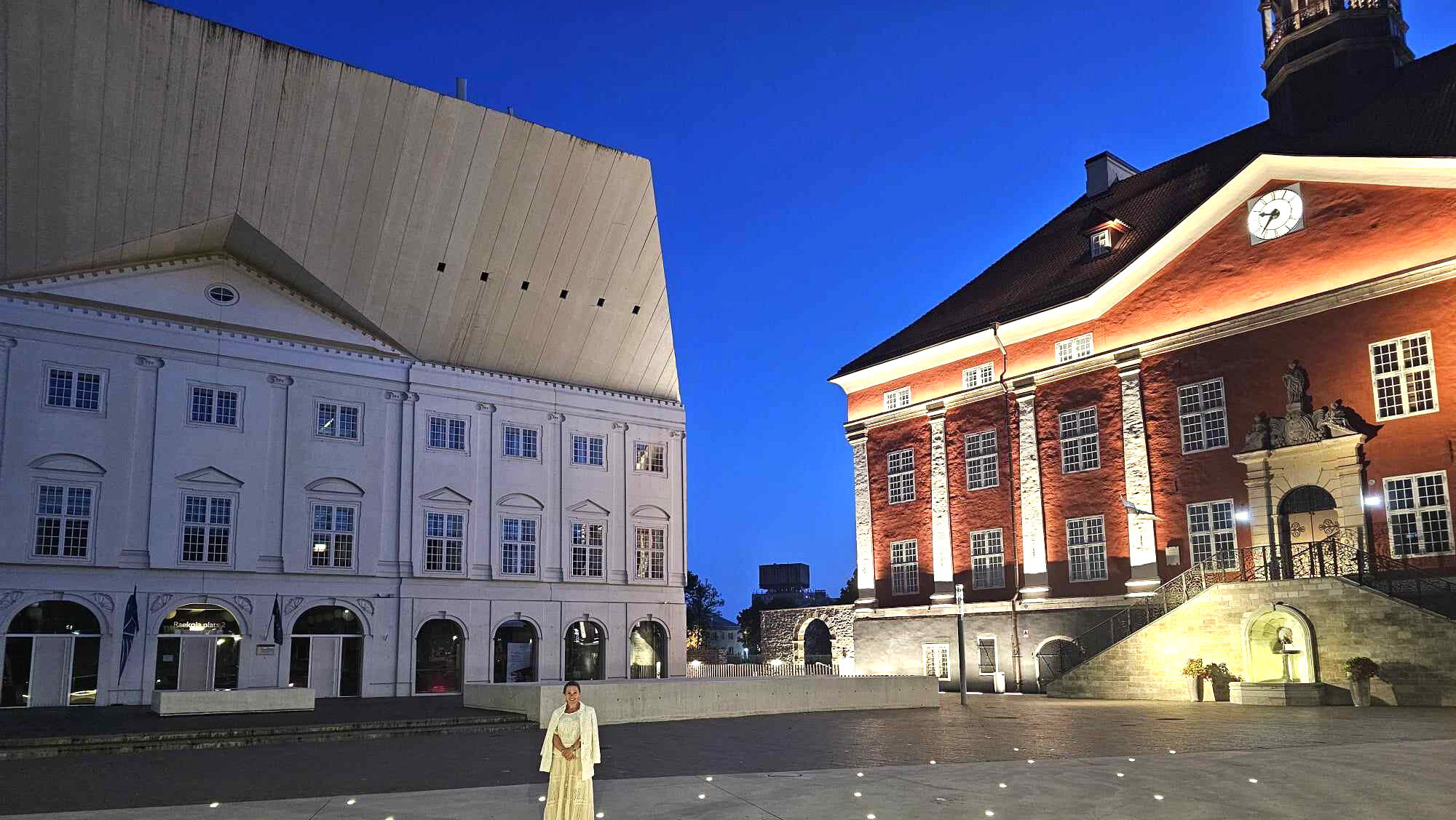to participate as poet and writer in the international festival of the Writers' and Artists' Residency in Val David, and as lecturer in the Cultural Programme at Tartu College in Toronto.
The guest speaker has collaborated in the translation of Juhan Liiv into Spanish and English, the latter, he noted, with the aid of Paul Saagpakk's groundbreaking Yale U. Press dictionary. He also collaborated in the publication of “On the Way Home: An Anthology of Contemporary Estonian Poetry” in English in India. Copies of the new bilingual Estonian-English selection of poems by Juhan Liiv, titled “Snow Drifts, I Sing”, (“Lumi tuiskab, mina laulan”), were available at TC throughout a recent “cultural marathon”. A videotaped introduction to the speaker and his work by friend and collaborator Prof. Harvey Hix of the U. of Wyoming, emphasized Prof. Talvet's generosity and sharing from the moment he first set out for Estonia with the research question, “What has happened with poetry in the newly independent Baltic states?”
A specialist in Western European literature, the speaker recounted his later research and involvement with the corpus of writing by and about Juhan Liiv. To start, he served on the jury of the Juhan Liiv Prize for Poetry. What quality is particular to Liiv, he asked himself? The speaker was struck by the meditative quality of his poems. To audiences both intimately and more distantly connected to the question of the significance of Juhan Liiv for Estonian culture, he spoke of his skepticism regarding the myth of Liiv as a “mad genius”, and of his growing appreciation of Juhan Liiv's poetry, language, and thought.
Listeners at the second talk were first provided with an orientating background and context. Estonia's recent distinction as a new member state in the European Union, in NATO, and in the European monetary union, were contrasted with the heritage of centuries of serfdom in Liiv's time, and with the situation of Finland within Sweden in those same centuries. In the first selection of Liiv's poetry translated by Talvet and Hix titled “The Mind Would Bear No Better” (“Meel paremat ei kannata”), can be seen a patriotic and existentialist response to his heritage.
Also reflected in Liiv's poems is his understanding of suffering. The life of Juhan Liiv (1864-1913) merited, too, a backgrounder. Since the 1930's virtually every Estonian can recite some of Liiv's poems by heart, but very little is known about him outside Estonia. Liiv came from a talented family, who lived by Lake Peipus, which separated Estonia from Russia. His brothers included a writer and a musician. Liiv lived all his life in poverty. He was not happy in love. His poetry was largely ignored and derided in his lifetime as he broke with conventions. He was largely self-taught. After working as a journalist he sought a livelihood as a professional writer and wrote what is widely known as his best story “Vari” (“The Shadow”), in which he depicts the tragic consequences of German domination in Estonia. Not long afterwards he was diagnosed with schizophrenia, and several contemporaries reported symptoms of persecution and delusions of grandeur in their memoirs. Yet, surprisingly, according to the speaker, Liiv had a coherent philosophy that sets him apart as wiser than his contemporaries.
Unlike the poet, Hölderlin, whose mental illness and reclusion in the second half of his life made him fade from his contemporaries' view, Liiv would disappear and then reappear in Tartu. The playright Hella Wuolijoki (née Ella Murrik) lived in the same house with Liiv. The speaker recommended we read what she wrote about him. Just published by Tartu U. Press is her play “Dr. Lucius and the Poet”, the manuscript of which he located intact in the Theatre and Music Museum and co-edited. “Lucius”, with an allusion to “Lucifer”, plays on “Luiga”, the name of the doctor, man of science, who treated Juhan Liiv, poet. Between them is an emancipated woman, the action in pre-Republic Tartu. Though we may have guessed the life of Juhan Liiv has been sufficiently described, this work suggests that it is not so.
On both evenings, the speaker chronicled the dissemination of Liiv's poetry in Estonia, and reflected on the influence of Liiv's champions. He began by noting the anomalies and variations in the publication of Liiv's poetry that first piqued his interest, and that had remarkably gone unnoticed. Liiv lacked the resources to publish his own poetry and, dissatisfied with the first publication brought out by Friedebert Tuglas, demanded that all copies be destroyed. Liiv's many-layered revisions of his poems on the same manuscript makes the editing of his works problematic. In Tuglas's estimation Liiv left behind about 1000 poems, of which 300 were worthy of publication. Aarne Vinkel added 76 new poems, and the speaker himself discovered about a dozen more, of which he and Hix, on video, presented a few examples.
While signalling the importance of Tuglas in bringing Liiv to public awareness, the speaker challenged his view that Liiv was “as if a miracle, who began to write good poems only in the period of his mental illness” (Eesti Elu Nr. 41 2013). As Purje went on to summarize, Liiv also had good poems before he took ill. He was far and away not only a lyrical poet, but also a philosopher, in some respects even a sarcast. Underlying Liiv's literary work there is a coherent philosophy to which Tuglas did not attend. Holism, the wholeness of life, characterizes Liiv and sustains his philosophy.
Whether in the Q&A or over coffee and kringel, all questions, from keenly interested listeners, got answered, with a goodwill and candour that recalled the opening remarks by Prof. Hix. The speaker presented copies of the aforementioned play “Dr. Lucius and the Poet” to Jaan Meri and Piret Noorhani, co-hosts and organizers of the bilingual, two-night event. When asked whether folk verse was in Liiv's time and for Liiv a living tradition, he again noted Liiv's place of upbringing and delighted everyone with his zestful reading of a folk-inspired Liiv verse in the Estonian. Thank you Prof. Talvet. It was good to read, not only literature but culture, and gain perspective on our living myths.
Alja Pirosok




